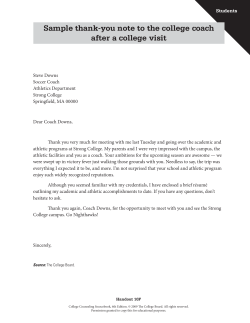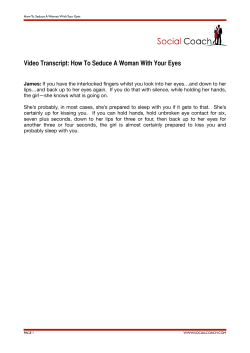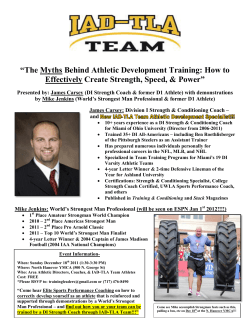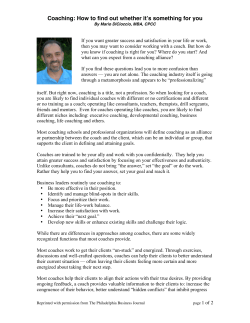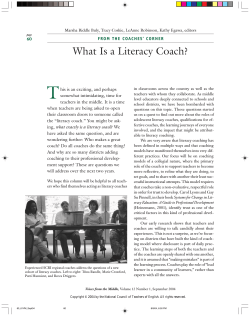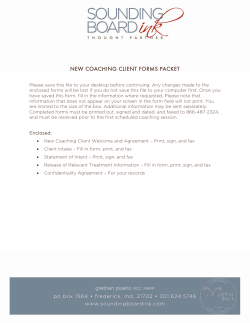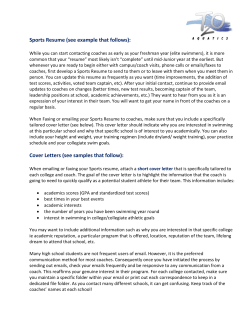
Results # 23 - How to Choose a Business Coach… Rules OK
Results Rules OK The “How to” Series # 23 - How to Choose a Business Coach… Working with a Business Coach can be the best investment you can make; a good Coach will enable you to achieve great results both professionally and personally. But how do you know what a great Business Coach looks like, what attributes should they have, and how does Coaching work…? Traditionally, to get help in your business there were a number things you could do; 1. Hire a Consultant – typically, a consultant will assess a situation and then recommend a course of action to improve it. Consultants are great where there is a specific identified issue and specialist knowledge and experience is required, the relationship tends to be project based and short term duration. 2. Employ a Specialist – recruiting a specialist to the team, means that you have key skills and experience built into your company and you are able to develop improved products and services for your customers. The challenge with employment is that it can be expensive and as the environment changes, different skills will be required. 3. Education – learning about business through academic or formal training is a great way of building skills and understanding. The down side is that it will take a lot of time and involve weekend and evening study, and the relevance of the course to your business may not be what you expected. 4. Do Nothing – hope is a strategy that many business owners choose. Using instinct and best guess will deliver results; just not the results that were anticipated. Doing nothing is however cheaper in the short term, good for cash flow and doesn’t challenge the ego. It tends to fall down in the medium and long term however. Then, someone invented a new genre – enter the Business Coach. A Business Coach effectively combines all the positive attributes of the traditional choices, excluding of course the option of doing nothing. Coaching tends to be a long term relationship, using a generalist approach, with someone that you trust and respect. There are three main aspects to the Coaching relationship; 1. Transactional Coaching – getting things done using proven tools and techniques. 2. Transformational Coaching – challenging and adapting the mindset of a client. 3. Accountability – the Coach holding the client accountable for agreed activities and outcomes. The Coach will then need to understand; 1. Current – what is the current situation, what is the starting point for the journey? 2. Future – what is the desired outcome or future set of objectives to be achieved? 3. Route – how fast do you need to get there, and what is the preferred method or program? Armed with these tools and information about your objectives, your Coaching program is all set. The emphasis on Transactional, Transformational and Accountability will depend on the needs of you and your business which may change during the course of your program – this is the art of Coaching, and it is the ability of your Coach to be able to use all three with equal proficiency that will determine your success, and help you choose the right one for you. © 2011 Results Rules OK Ltd Results Rules OK The “How to” Series # 23 - How to Choose a Business Coach… Imagine a sports team or an athlete – they all recognise that having a great Coach helps them achieve their best results. The Coach will agree the objectives, identify the strategy and tactics that will get the results and then coach the client on a regular basis such that results are achieved. The Coach does not actually do the work for you, they will observe and monitor performance, then explore the options with you, agree the next stage and repeat the process. So a great Coach will need to be proficient in ALL three aspects of the Coaching Relationship, so here is how to choose a Business Coach; 1. Transactional Skills – whilst your Coach doesn’t need to be an expert in the business sector that you operate, they must have solid business experience as a business owner, senior executive with responsibility for sales, profit & cash. Additionally they should be able to demonstrate a level of knowledge and understanding that gives you the confidence that you can trust their judgement – if they have business qualifications then so much the better, although an MBA without any practical application is of little use as a Coach. They must have a method of building a business, a philosophy that resonates with you and is simple and elegant to introduce to your business. Watch out for Coaches with less experience of business than you – they should have a broad background and be able to share a couple of failures with you as well as a list of successes. Also make sure that the Coach is not simply a Consultant who has “tippexed” out the title Consultant on their business cards and printed Coach there instead to make them appear more contemporary. 2. Transformational Skills – are you prepared to be guided by the Coach and challenged on your actions and behaviours? Is your Coach actually someone you aspire to be like? Coaching is all about asking great questions in order to adapt behaviour in order to achieve a beneficial result, it is the quality of the questions that will determine the level of results in the Coaching relationship. Ideally, you don’t want to be the first Client a Coach has ever had, you and your business should not be a learning exercise for them. Do they have the confidence and ability to ask you the great questions, or will they steer clear of this just in case they upset you and they lose you as a client – a great Coach will ask the tough questions, even the ones that make you feel uncomfortable. Watch out for anyone who has attended a tree hugging workshop in Swindon and has a certificate as a Master Wizard from the University of Psychobabble. 3. Accountability – are they tough enough and trustworthy enough that you would allow yourself to be held accountable by them? In essence, you need to respect and like your Coach – they may never be your best friend, but you need to build a long term professional relationship with them. Remember to ask yourself if you are ready for a Coaching relationship, are you prepared to learn new skills, be challenged and held accountable to achieve results you have chosen not to even dream of right now? Make sure that they operate from a position of passion from your success – Ghengis Khan was not a Coach… To find out more about Coaching and how to great results, and compare our Coaches to the criteria above, simply go to www.resultsrulesok.com and come along to one of our events or email me at davidholland@resultsrulesok.com Or if you really can’t wait call us on – 0121 416 0023 © 2011 Results Rules OK Ltd
© Copyright 2025
